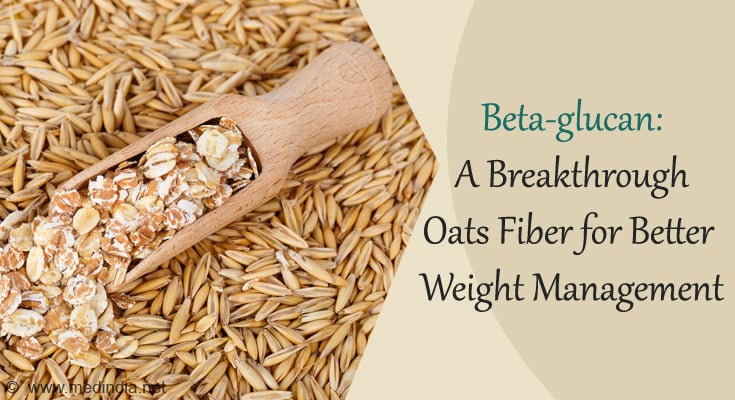- Beta-glucan fiber significantly improved weight loss in a mouse study
- High fiber diets aid in overall health and metabolic improvement
- Gradually increasing fiber intake can enhance digestion and weight management
Maintaining a healthy weight is closely linked to fiber intake, and recent research sheds light on which type of fiber may be most beneficial. A new study has highlighted beta-glucan, a fiber found in cereals and oats, as particularly effective in inducing weight loss compared to other fibers. This research, published in The Journal of Nutrition, suggests that beta-glucan could be a promising dietary approach for managing metabolic disease, provided similar results are seen in human studies (1✔ ✔Trusted Source
How your morning oats could help you manage your weight
).
Beta-glucan from oats and cereals could help you lose weight more effectively than other fibers. #medindia #weightmanagement #betaglucan’
Advertisement
The Importance of Fiber in Our Diet
Historically, fiber was thought to be merely a digestive aid, helping to keep our bowels regular. However, our understanding of fiber has evolved, recognizing its critical role in gut and overall health. Since our digestive system cannot break down fiber, it travels through most of the digestive tract until it reaches the large bowel. Here, it is fermented by gut bacteria, producing beneficial compounds such as short-chain fatty acids (SCFAs).
Dr. Mir Ali, MD, a board-certified bariatric surgeon, emphasizes the multiple benefits of a high-fiber diet, including improved cholesterol and blood glucose levels, regular bowel movements, and reduced risk of various bowel conditions. Similarly, Dr. Janese Laster, MD, highlights that increasing dietary fiber can alter the microbiome, enhance satiety, and potentially improve metabolic health. SCFAs produced from fiber can also support overall health by nourishing gut cells and entering the bloodstream.
Advertisement
Types of Fiber and Their Effects
Fiber is generally categorized into two types, each playing a distinct role in health:
Soluble Fiber: Dissolves in water to form a gel-like substance, which can help lower blood cholesterol and glucose levels.
Insoluble Fiber: Does not dissolve in water but absorbs it, aiding in healthy bowel movements.
In the study, mice were fed one of five different fibers over 18 weeks:
- Pectin: A soluble fiber from fruits.
- Beta-glucan: A soluble fiber found in cereals, yeast, mushrooms, and seaweeds.
- Wheat Dextrin: A soluble fiber available as a supplement.
- Resistant Starch: A type of starch that functions similarly to fiber.
- Cellulose: An insoluble fiber found in plant cell walls.
The study found that while all fibers altered the gut microbiome and SCFA levels, only beta-glucan significantly reduced body weight, fat mass, and improved glucose tolerance.
Dr. Chris Mohr, Ph.D, RD, expressed surprise at beta-glucan’s pronounced impact on weight management and glucose tolerance, noting that other fibers did not exhibit similar effects. Susan Bowerman, a registered dietitian, was also intrigued by these findings, particularly because other soluble fibers, such as pectin, did not show the same results.
Advertisement
The Role of Beta-glucan in Heart Health
Beta-glucan is already recognized for its benefits to heart health. Both the U.S. Food and Drug Administration (FDA) and the European Food Safety Authority (EFSA) allow health claims regarding beta-glucan’s role in supporting heart health. However, its impact on weight loss remains less clear. Human metabolism and gut microbiota are complex, and while animal studies are promising, further research is needed to confirm these findings in humans.
Increasing Fiber Intake
Regardless of the specific type of fiber, increasing fiber intake reduces disease risk and supports healthy weight management. Most people need to consume more fiber daily. To boost fiber intake:
- Eat More Fruits and Vegetables: These are high in fiber and offer additional nutrients.
- Choose Whole Grains: Opt for whole grain bread, pasta, and rice over refined versions.
- Add Beans: Incorporate half a cup of beans like lentils or black beans into your diet.
- Snack on Nuts and Seeds: These are rich in fiber, healthy fats, and protein.
- Stay Hydrated: Fiber functions best when it absorbs water.
Experts recommend gradually increasing fiber intake to avoid digestive discomfort, such as bloating or increased stool frequency. Nikky Contractor from Amway suggests that diversity in fiber sources is also important, aiming to consume a variety of fruits and vegetables.
While beta-glucan shows promise as a potential weight-loss aid, focusing on a fiber-rich diet with fruits, vegetables, nuts, seeds, and whole grains remains a practical approach for better health and weight management. Incremental changes in diet can lead to significant long-term benefits, making it a sustainable and effective strategy for improving overall well-being.
Reference:
- How your morning oats could help you manage your weight – (https://news.arizona.edu/news/how-your-morning-oats-could-help-you-manage-your-weight)
Source-Medindia



